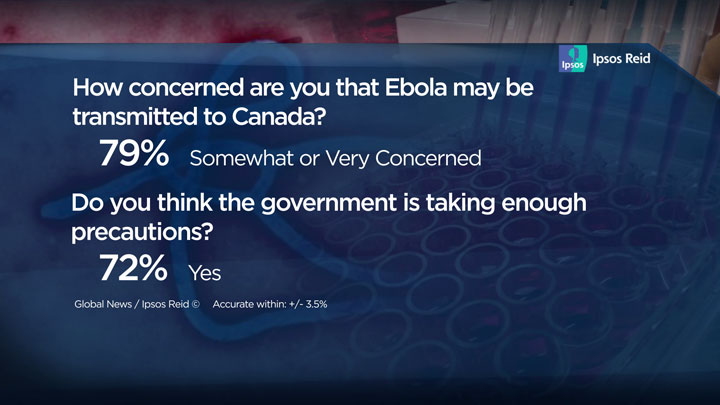WATCH: Eric Sorensen is keeping track of the spread of Ebola in Africa and on this side of the Atlantic.

TORONTO – In the last two months, Canadians’ concern about the deadly Ebola outbreak has increased significantly, according to an exclusive Global News / Ipsos Reid poll released Tuesday.
Seventy-nine per cent of Canadians say they’re either very or somewhat concerned that the Ebola virus “may be transmitted to Canada by a person who has visited the outbreak areas in Africa who has unwittingly infected others through travel and contact,” according to the poll.
That’s compared to 67 per cent of Canadians who were concerned in a similar poll two months ago.
READ MORE: 5 reasons why an Ebola outbreak is highly unlikely in Canada
But, those surveyed are also increasingly confident Canadian officials are taking the right steps to prevent spread of the disease in the country. Seventy-two per cent believe “health, government and other officials are taking enough precautions and preparations to ensure that the virus does not come into Canada.” That’s up from 63 per cent who thought the right steps were being taken in August.
READ MORE: How does Ebola spread?
Ipsos Reid Global Public Affairs CEO Darrell Bricker said these results are unusual, since normally confidence goes in one direction and awareness the other. Bricker suggests communication about Ebola from officials to Canadians has been handled very well.

Get weekly health news
“You don’t typically see people get concerned, and then turn to the government and say, ‘Well I think they’re going to do a great job of this, or they are doing a great job of this.’ This is one of those very rare examples.”
However, feelings of concern as well as confidence in Canadian precautions vary across the country and depending on education level of respondents or age.
Concern is highest in Ontario (82 per cent) and least in Saskatchewan and Manitoba (70 per cent). Bricker suggests the higher concern in Ontario could be due to the higher amount of international travel and immigration in the province compared to others.
Concern is also higher among those with a high school diploma/some postsecondary education, but lower among people without a university degree or without a high school diploma.
Confidence that the appropriate precautions are being taken to prevent Ebola’s spread is highest in Atlantic Canada (78 per cent), and lowest in British Columbia (at 68 per cent). Respondents aged 18 to 34 years old are most likely to feel confident in precautions (at 78 per cent), while fewer of those polled between ages 35 to 54 (at 71 per cent) and those aged 55 plus (at 68 per cent) are confident.
Bricker says higher confidence in the younger age group may be because older groups are a bit more skeptical of Canada’s ability to control the disease due to life experience.
“You’ve got people who’ve lived through epidemics in the past and have been told that things are safe or that they shouldn’t be concerned, and then lo and behold—like the AIDS crisis–we did have to end up being concerned,” he said.
There was no difference between men and women when it came to concern over spread or confidence in preventative steps.
READ MORE: 5 things we learned from the U.S., Spanish Ebola cases
At 95 per cent, nearly all Canadians polled are aware of the Ebola outbreak, up from 84 per cent who were aware in August. The World Health Organization said Tuesday West Africa could see up to 10,000 new Ebola cases a week within two months, while confirming the death rate has now risen to 70 per cent.
Exclusive Global News Ipsos Reid polls are protected by copyright. The information and/or data may only be rebroadcast or republished with full and proper credit and attribution to “Global News Ipsos Reid.”


Comments
Want to discuss? Please read our Commenting Policy first.